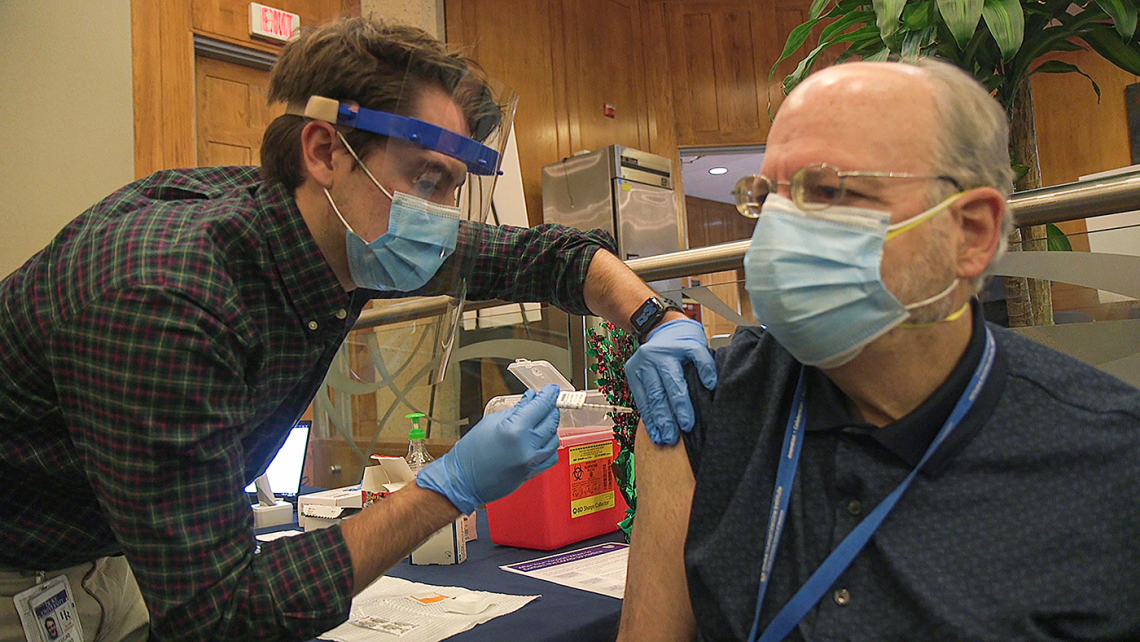
Dr. Barton Haynes received his first dose of the COVID-19 vaccine Wednesday with the confidence of a researcher who has spent his entire career studying the science of vaccines.
The director of the Duke Human Vaccine Institute, Haynes is internationally known for his work with viruses, including HIV and influenza. The experience and knowledge of the Institute and its counterparts around the world contributed to the unprecedentedly rapid development and testing of the vaccine against COVID-19.
After he received his shot Wednesday, Haynes talked about the many continuing questions researchers still have about the COVID-19 virus and why Americans should have confidence in the safety and durability of the vaccine.
Q: Is the vaccine safe? Doesn’t the speed with which it was produced mean there were shortcuts taken?
HAYNES: My answer is yes, it appears to be extremely safe, based on the data that we have right now.
This vaccine got made so quickly simply because of all the previous work that has been done on other vaccines, in particular on HIV over the past 15-20 years. The field took all that technology and shifted it immediately to the COVID vaccine.
Where this vaccine was accelerated wasn’t in the safety measures and in the development, but in the production. The production started at the time of the clinical trials, which is way before it normally would have. So, if the vaccine hadn’t worked, all this produced vaccine material would have simply been destroyed. But because the vaccine did work, the material that was produced could be immediately put into distribution.
Q: Does this mean I can get rid of my mask?
HAYNES: (The vaccine) does a really good job of protecting against the disease. That’s a big deal. But we don’t know if these vaccines protect against asymptomatic infection.
This is an unusual virus. It can cause a situation that, even if the person isn’t symptomatic, the virus can be produced and then it can be spread to others. Until the time that we (know the vaccine prevents asymptomatic infections) we have to wear a mask and keep our physical distance from others.
These studies are ongoing and we should know the answer in June. Once we get that answer, then we can take off our masks.
Q: How long does the vaccine provide protection?
HAYNES: We don’t know. That’s going to dictate how often we’ll have to get a booster. If it wanes after one year, that’s when we’ll have to get a booster. If it’s like tetanus, which has 10 years of protection, that’s when we’ll get the booster.
We’ll be learning an enormous amount about this virus and this vaccine over the coming years. We should know something (about its longevity) by the end of the coming year.
Q: How will the safety and efficacy of the vaccine be monitored over time?
HAYNES: Both the FDA and the CDC are committed to evaluation of the vaccine. The vaccines will be evaluated on how they work, how much they protect, and their safety profile. All of this information will be made public and transparent, not just to doctors and patients, but to all of the American public.
The Pfizer vaccine right now only has an emergency use authorization, not even a license. Right now, the FDA and CDC will monitor people like me who get the vaccine. After the vaccines are licensed, they’ll continue to do what’s known as post-licensing surveillance to make sure any long-term side effects have been found.
Q: What role is Duke playing in vaccine development and research?
HAYNES: Duke has several major roles in pandemic studies. For one, we’re working hard on next generation of vaccines. Some of this research is necessary so that should the virus escape the current immunity response [produced by the vaccine], we’ll have a new vaccine ready that will take care of it. And this is the kind of virus that does mutate and escape! Fortunately, it’s not doing that very quickly, but we want to be prepared.
Second, we don’t know how potent vaccine will be. So, we’re working on a vaccine that will work for a very long time, because we don’t want people to have to be vaccinated any more frequently than they need to be.